Six ATX/MATX/EATX Motherboards for Your BYO NAS Build
Building your own NAS (Network Attached Storage) offers unparalleled control over your storage solution, but choosing the right motherboard is crucial. While ITX motherboards are commonly used for compact builds, ATX motherboards excel in scalability and performance. This guide explores six top ATX motherboards suitable for DIY NAS builders and explains why ATX might be the right choice for your project.
ATX vs. ITX: Understanding the Differences for NAS Use
ITX motherboards have long been favored for NAS systems due to their compact size, lower power consumption, and often pre-included mobile CPUs. These features make them ideal for smaller, quieter builds with minimal hardware requirements. However, ITX boards typically offer fewer PCIe slots, fewer SATA ports, and limited M.2 storage options, which can restrict scalability for larger storage systems. In contrast, ATX motherboards shine in builds where storage and expansion are priorities. They offer multiple PCIe slots for RAID cards, network cards, and GPUs, along with extensive SATA and M.2 connectivity. While ATX motherboards tend to consume more power and require larger cases, they cater to the growing demands of NAS builders who need flexibility and performance. If you’re planning to scale your NAS system or integrate high-speed networking, ATX is often the better choice despite its higher price point and larger physical footprint.
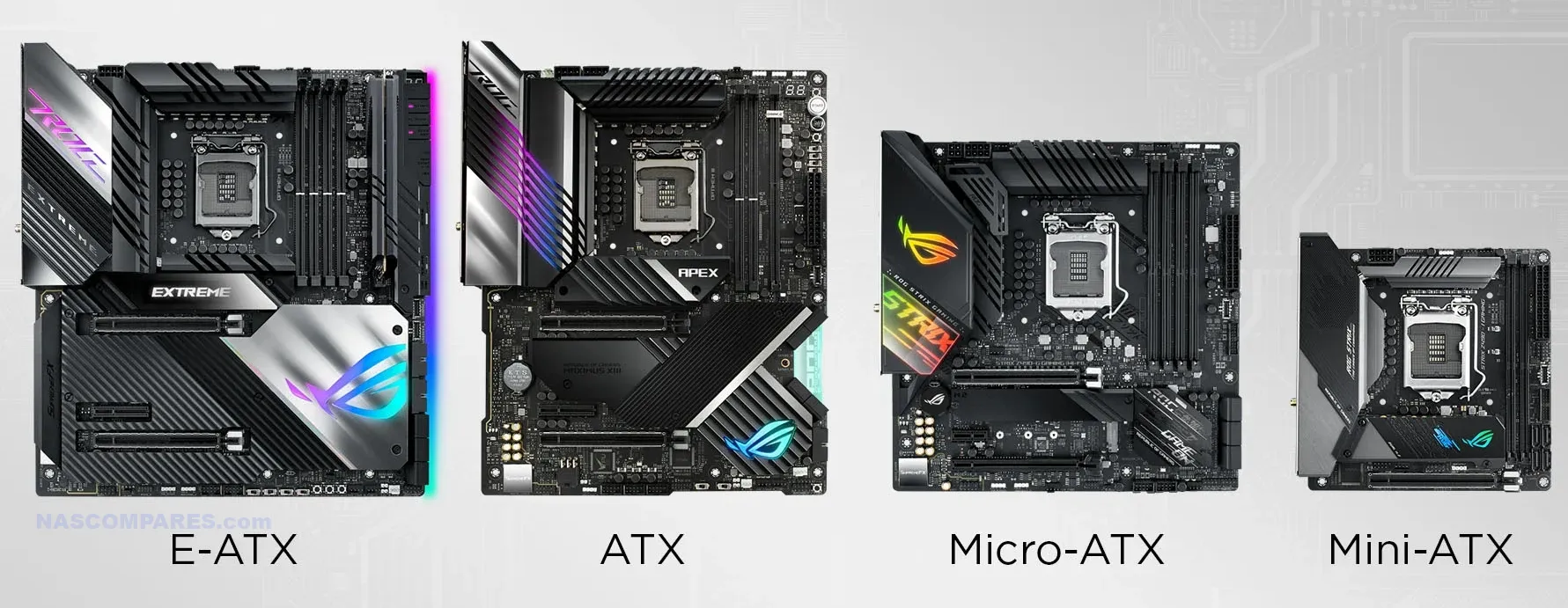
Motherboard form factors play a critical role in determining a system’s size, expandability, and compatibility. mATX (Micro-ATX), ATX (Advanced Technology Extended), and E-ATX (Extended ATX) represent progressively larger sizes, each catering to different use cases. mATX motherboards are compact and typically measure 9.6 × 9.6 inches, making them ideal for small cases and builds that prioritize a smaller footprint. However, they often sacrifice expandability, offering fewer PCIe slots, SATA ports, and overall connectivity. Standard ATX motherboards, measuring 12 × 9.6 inches, strike a balance between size and functionality, providing ample room for multiple PCIe slots, more storage options, and better cooling configurations. Finally, E-ATX motherboards, measuring up to 12 × 13 inches, cater to high-performance builds such as workstations or enterprise systems. They offer additional PCIe lanes, memory slots, and connectivity options but require larger cases and often consume more power. The choice between these form factors depends on your specific needs for expandability, performance, and the physical constraints of your build.
1. MSI MAG B550 Tomahawk
VALUE OPTION – AMD Ryzen Support, 6 SATA Ports, 2 M.2 NVMe Slots (Gen 4 + Gen 3), 2.5GbE + 1GbE LAN, DDR4 ECC Support, ATX, Multiple USB Ports – $160 (HERE)
The MSI MAG B550 Tomahawk is a reliable and feature-rich entry-level motherboard that provides excellent value for small to medium NAS setups. Built on AMD’s B550 chipset, it supports Ryzen 3000, 4000, and 5000 series processors, giving builders access to high-performance CPUs. The board can accommodate up to 128GB of DDR4 memory, with ECC support ensuring data integrity for critical storage applications. This feature is particularly important for NAS systems, where even minor data corruption can lead to significant issues.
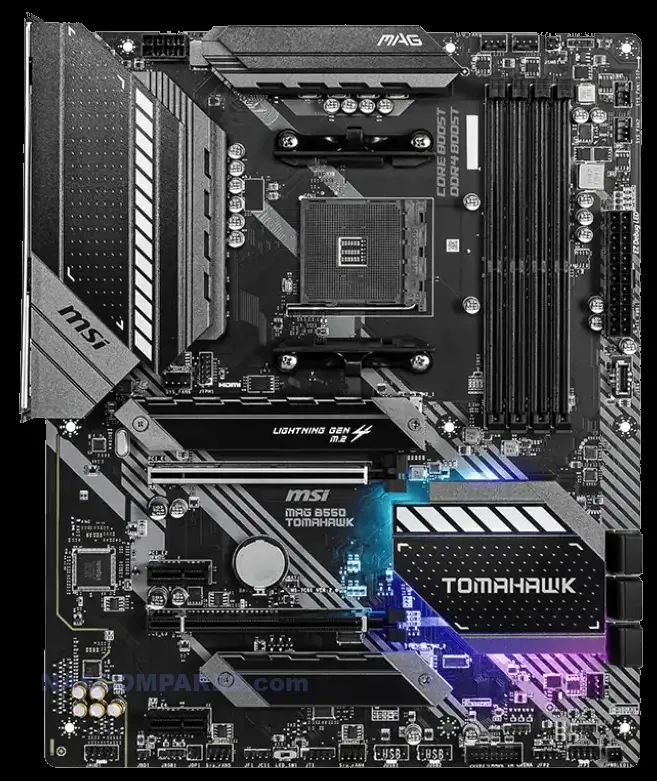
On the storage front, the B550 Tomahawk offers six SATA III ports and two M.2 slots, providing ample options for both traditional hard drives and high-speed NVMe SSDs. The primary M.2 slot supports PCIe Gen 4, delivering up to 64Gbps of bandwidth, making it ideal for caching or handling high-speed data operations. The second M.2 slot, while limited to PCIe Gen 3, is still more than capable for secondary drives or less demanding workloads. Its two PCIe x16 slots enable expansion options, such as adding a GPU for transcoding or a RAID controller for additional storage management.
The networking setup includes one 2.5GbE and one 1GbE port, sufficient for home NAS systems or small-scale offices. While the board lacks advanced connectivity features like Thunderbolt or Wi-Fi, its affordability (around $160) makes it an attractive choice for budget-conscious builders. Additionally, the board’s user-friendly BIOS and comprehensive I/O options ensure ease of setup and compatibility with a wide range of components.
| Specification | Details |
|---|---|
| Socket | AM4 |
| Chipset | AMD B550 |
| Max Memory | 128GB DDR4 (ECC support) |
| SATA Ports | 6 |
| M.2 Slots | 2 (1× Gen 4, 1× Gen 3) |
| PCIe Slots | 2× PCIe x16, 2× PCIe x1 |
| Ethernet Ports | 1× 2.5GbE, 1× 1GbE |
| Price | ~$160 |
| Form Factor | ATX |
2. ASRock IMB-X1314
Good Middle Ground Choice – Intel 12th-14th Gen Processor Support, 8 SATA Ports, 2 M.2 NVMe Slots (Gen 4), 3x 2.5GbE LAN, DDR4 ECC Support, Micro-ATX, TPM & USB Ports – $350 (HERE)
The ASRock IMB-X1314 is a professional-grade motherboard that provides exceptional features tailored for NAS and server builds. Designed to support Intel’s 12th to 14th Gen processors, it accommodates up to 128GB of DDR4 ECC memory, ensuring optimal reliability for storage applications. This board is particularly appealing for users who require a robust, scalable solution for high-capacity and data-intensive environments.
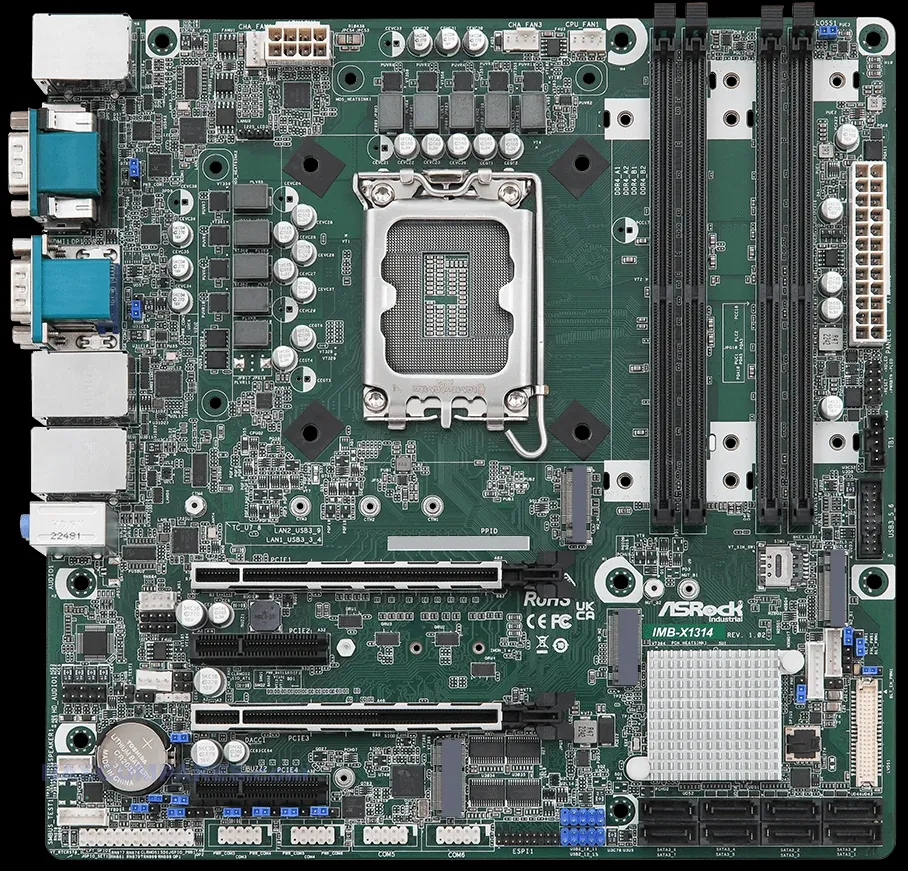
For storage, the IMB-X1314 features eight SATA III ports and two M.2 slots. The SATA ports allow for large-scale HDD arrays, perfect for archival storage or bulk data retention, while the M.2 slots provide fast NVMe SSD options for caching or active data operations. Both M.2 slots support PCIe Gen 4, ensuring maximum performance for modern SSDs. Its PCIe layout includes a x16 slot for GPUs or RAID controllers, a x8 slot for additional expansion, and two x4 slots for networking cards or storage accelerators.
Networking is a strong point for the IMB-X1314, with three 2.5GbE ports. These ports enable link aggregation for increased throughput or allow the board to handle multiple subnets, catering to advanced network setups. Security and management features, including onboard TPM 2.0 and Intel vPro support, make this board suitable for enterprise-grade use cases.
Despite its $350 price point, the IMB-X1314 offers excellent value for its advanced features. The robust design and wide range of I/O options ensure compatibility with modern components, while its efficient power delivery system minimizes energy costs for 24/7 operation.
| Specification | Details |
|---|---|
| Socket | LGA 1700 |
| Chipset | Intel W680 |
| Max Memory | 128GB DDR4 (ECC support) |
| SATA Ports | 8 |
| M.2 Slots | 2 |
| PCIe Slots | 1× PCIe x16, 1× PCIe x8, 2× PCIe x4 |
| Ethernet Ports | 3× 2.5GbE |
| Price | ~$350 |
| Form Factor | Micro-ATX |
3. ASRock Z890 NOVA WiFi
Good Affordable Flash Solution – Intel Z890 Chipset, 4 SATA Ports, 5 M.2 NVMe Slots (Gen 5 + Gen 4), 5GbE + 2.5GbE LAN, DDR5 Support, ATX, Thunderbolt 4 + WiFi 7 – $450 (HERE)
The ASRock Z890 NOVA WiFi is a state-of-the-art motherboard designed for high-performance NAS setups. Featuring Intel’s Z890 chipset, it supports up to 256GB of DDR5 memory, offering unmatched performance for memory-intensive applications. Its compatibility with the latest Intel processors ensures builders can harness cutting-edge technology for their NAS.
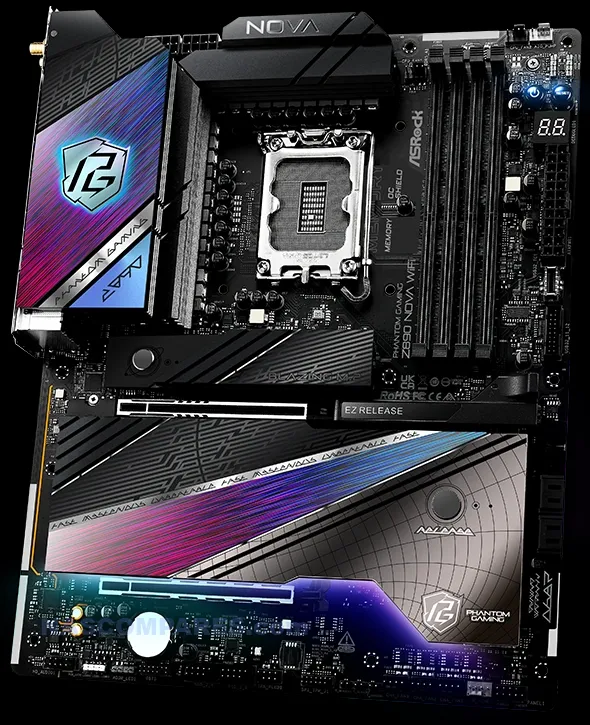
In terms of storage, the Z890 NOVA boasts five M.2 slots, one of which supports PCIe Gen 5, delivering exceptional speeds for NVMe SSDs. The other four slots utilize PCIe Gen 4, making this board ideal for hybrid storage configurations that balance speed and capacity. Additionally, it includes four SATA III ports, accommodating traditional HDDs for bulk storage needs. The robust PCIe layout allows for additional networking cards, RAID controllers, or GPUs, giving builders the flexibility to tailor their system to their specific requirements.
Networking options include a 5GbE and a 2.5GbE port, ensuring reliable, high-speed data transfer. Its Thunderbolt 4 connectivity further enhances its utility, allowing seamless integration with external storage devices or high-speed peripherals. Wi-Fi 7 and Bluetooth 5.4 provide additional wireless options, making the Z890 NOVA suitable for modern, connected environments. At approximately $450, this motherboard offers a perfect blend of performance, scalability, and connectivity for demanding NAS builds.
| Specification | Details |
|---|---|
| Socket | 1851 |
| Chipset | Intel Z890 |
| Max Memory | 256GB DDR5 |
| SATA Ports | 4 |
| M.2 Slots | 5 (1× Gen 5, 4× Gen 4) |
| PCIe Slots | 1× PCIe 5.0 x16, 1× PCIe 4.0 x16 |
| Ethernet Ports | 1× 5GbE, 1× 2.5GbE |
| Price | ~$450 |
| Form Factor | ATX |
4. BKHD-2011-mATX (Refurbished)
Budget Refurbished Option – Intel Xeon E5 Support, 10 SATA Ports, 2 M.2 NVMe Slots, 4x 2.5GbE LAN, DDR4 ECC Support, Micro-ATX, PCIe 3.0 Slots – $320 (HERE)
The BKHD-2011-mATX is a robust, enterprise-oriented motherboard tailored for high-capacity storage and demanding workloads. It is compatible with Intel Xeon E5-2600 v3/v4 processors and supports up to 256GB of DDR4 memory, making it a solid choice for users building NAS systems that require exceptional multitasking and performance. Its support for ECC memory further ensures data integrity, a key requirement for enterprise-grade storage solutions.
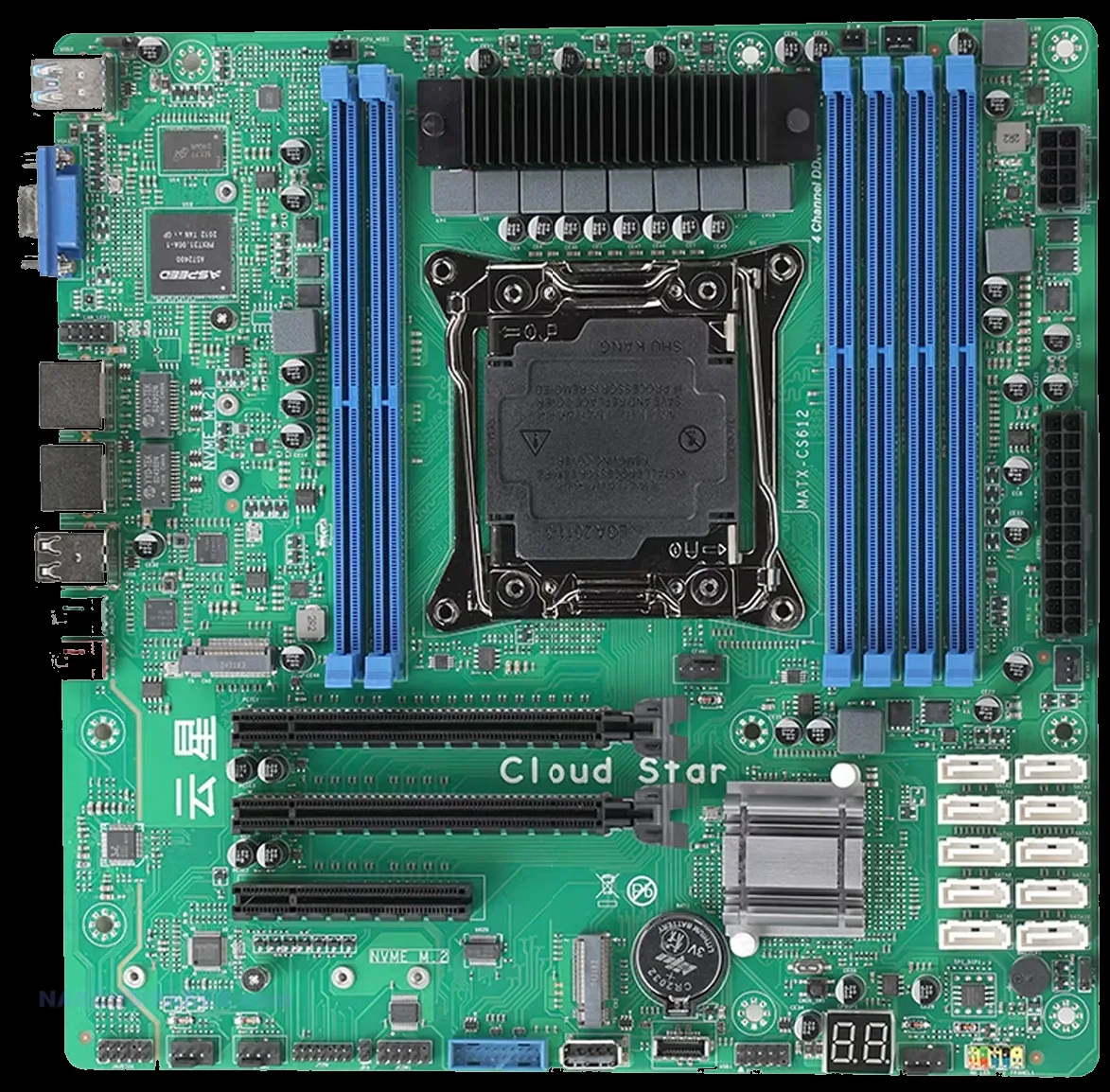
This motherboard excels in storage flexibility, featuring ten SATA III ports and two M.2 slots that support NVMe SSDs. The SATA configuration allows for vast storage arrays, ideal for archival or bulk storage purposes, while the M.2 slots provide high-speed access for caching or active workloads. For expansion, it offers two PCIe x16 slots and one PCIe x8 slot, which can be utilized for additional storage controllers, advanced GPUs, or network accelerators.
Networking is another highlight of the BKHD-2011-mATX. Equipped with four 2.5GbE LAN ports, it can handle large data transfers across multiple networks or subnets. This makes it an excellent choice for virtualization environments or NAS systems supporting multiple clients. Despite its older architecture, it remains a compelling option due to its affordability, typically priced around $320. For users looking to build a NAS with enterprise-level capabilities on a budget, the BKHD-2011-mATX delivers outstanding value.
| Specification | Details |
|---|---|
| Socket | LGA 2011-3 |
| Chipset | Intel C612 |
| Max Memory | 256GB DDR4 (ECC support) |
| SATA Ports | 10 |
| M.2 Slots | 2 |
| PCIe Slots | 2× PCIe x16, 1× PCIe x8 |
| Ethernet Ports | 4× 2.5GbE |
| Price | ~$320 |
| Form Factor | Micro-ATX |
5. MSI MEG Z790 GODLIKE
Premium Flash Solution – Intel Z790 Chipset, 6 SATA Ports, 7 M.2 NVMe Slots (Gen 5 + Gen 4), 10GbE + 2.5GbE LAN, DDR5 Support, E-ATX, Thunderbolt 4 Ports – $800 (HERE)
The MSI MEG Z790 GODLIKE is a premium motherboard designed for builders seeking top-tier performance and scalability. Powered by Intel’s Z790 chipset, it supports Intel 12th, 13th, and 14th Gen processors and accommodates up to 256GB of DDR5 memory. With its ECC memory support and robust power delivery system, this board is well-suited for high-performance NAS systems handling mission-critical data.
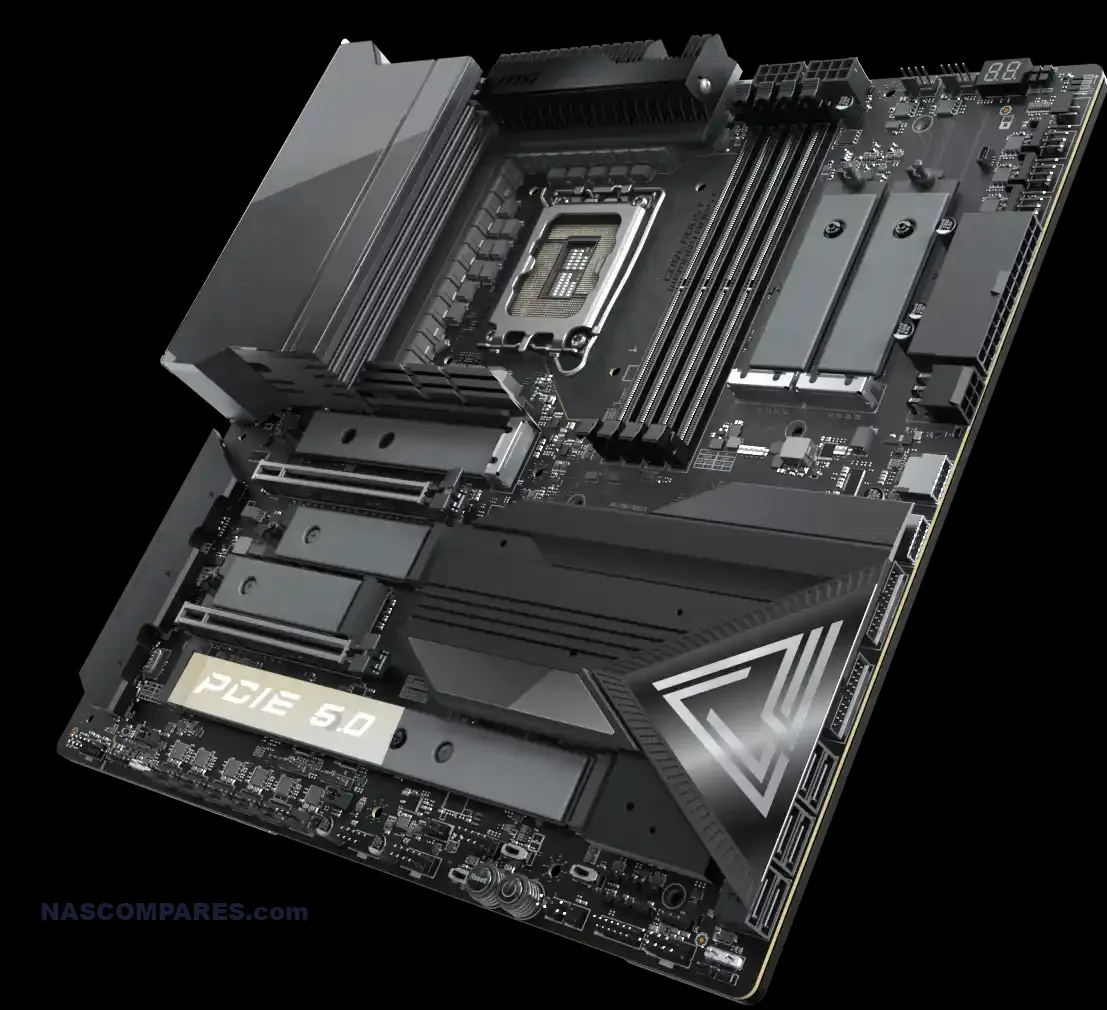
The GODLIKE excels in storage, offering seven M.2 slots, one of which supports PCIe Gen 5 for unmatched NVMe SSD speeds. The remaining six slots are PCIe Gen 4, ensuring fast and efficient data access. Additionally, six SATA III ports provide ample options for traditional HDDs, making this board suitable for hybrid storage configurations. Its PCIe layout includes two x16 Gen 5 slots, enabling seamless integration of GPUs or advanced RAID controllers.
For networking, the Z790 GODLIKE features dual Ethernet ports—a 10GbE and a 2.5GbE—ensuring ultra-fast data transfers and high reliability. Thunderbolt 4 connectivity expands its utility, supporting high-speed peripherals and external storage devices. Priced at approximately $800, this motherboard targets professionals and enterprise users who require cutting-edge technology and unparalleled scalability.
| Specification | Details |
|---|---|
| Socket | LGA 1700 |
| Chipset | Intel Z790 |
| Max Memory | 256GB DDR5 (ECC support) |
| SATA Ports | 6 |
| M.2 Slots | 7 (1× Gen 5, 6× Gen 4) |
| PCIe Slots | 2× PCIe 5.0 x16 |
| Ethernet Ports | 1× 10GbE, 1× 2.5GbE |
| Price | ~$800 |
| Form Factor | E-ATX |
6. ASUS Pro WS WRX80E-SAGE SE WiFi
POWERHOUSE VM SERVER – AMD Threadripper PRO Support, 8 SATA Ports, 3 M.2 NVMe Slots (Gen 4), 2x 10GbE LAN, 2TB DDR4 ECC Support, E-ATX, Remote Management – $1,300 (HERE)
The ASUS Pro WS WRX80E-SAGE SE WiFi is the ultimate workstation motherboard for enterprise-grade NAS systems. Built for AMD Ryzen Threadripper PRO processors, it supports up to 2TB of DDR4 ECC memory across eight channels, making it ideal for memory-intensive tasks like virtualization, large-scale data analytics, or multi-user NAS setups. This level of scalability is unmatched, ensuring future-proofing for years to come.
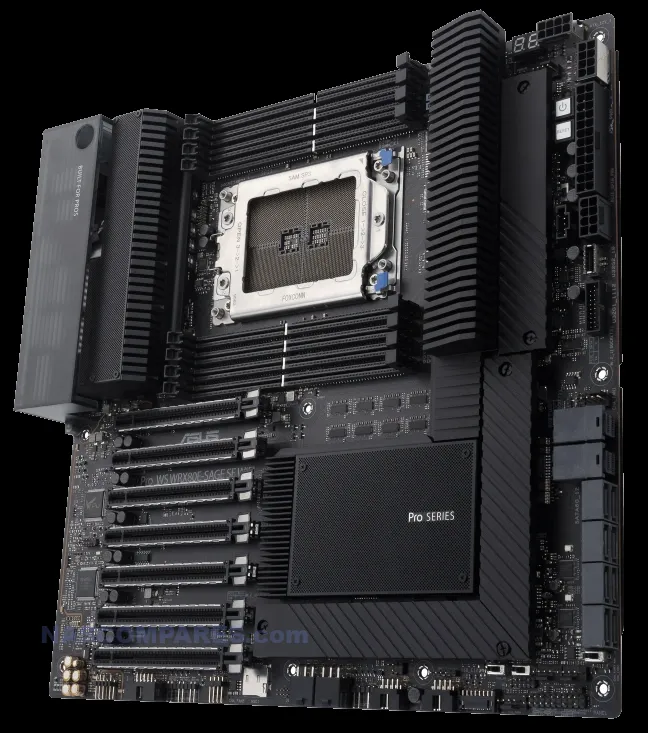
Storage options are equally impressive, with three M.2 PCIe Gen 4 slots, eight SATA III ports, and two U.2 slots capable of supporting NVMe drives. The M.2 slots are optimized for high-speed SSDs, while the SATA and U.2 ports provide bulk storage options, making it ideal for hybrid setups. Its seven PCIe 4.0 x16 slots allow for maximum expansion, accommodating GPUs, high-speed networking cards, and RAID controllers simultaneously.
Networking is handled by dual 10GbE LAN ports, ensuring seamless data transfer even under heavy loads. For remote management, the board includes ASMB9-iKVM, enabling hardware-level control through IPMI. Priced at $1,300, the WRX80E-SAGE SE WiFi is a high-end solution designed for enterprise users who demand unparalleled performance, reliability, and scalability.
| Specification | Details |
|---|---|
| Socket | sWRX8 |
| Chipset | AMD WRX80 |
| Max Memory | 2TB DDR4 (ECC support) |
| SATA Ports | 8 |
| M.2 Slots | 3 |
| PCIe Slots | 7× PCIe 4.0 x16 |
| Ethernet Ports | 2× 10GbE |
| Price | ~$1,300 |
| Form Factor | E-ATX |
Each of these motherboards offers unique features and configurations tailored to specific NAS requirements, ranging from budget-friendly options to high-performance enterprise solutions. Selecting the right board depends on your specific needs for scalability, storage, and networking capabilities. With the detailed specifications provided, you can confidently choose the best motherboard for your DIY NAS project.
📧 SUBSCRIBE TO OUR NEWSLETTER 🔔🔒 Join Inner Circle
Get an alert every time something gets added to this specific article!
This description contains links to Amazon. These links will take you to some of the products mentioned in today's content. As an Amazon Associate, I earn from qualifying purchases. Visit the NASCompares Deal Finder to find the best place to buy this device in your region, based on Service, Support and Reputation - Just Search for your NAS Drive in the Box Below
Need Advice on Data Storage from an Expert?
Finally, for free advice about your setup, just leave a message in the comments below here at NASCompares.com and we will get back to you. Need Help?
Where possible (and where appropriate) please provide as much information about your requirements, as then I can arrange the best answer and solution to your needs. Do not worry about your e-mail address being required, it will NOT be used in a mailing list and will NOT be used in any way other than to respond to your enquiry.
Need Help?
Where possible (and where appropriate) please provide as much information about your requirements, as then I can arrange the best answer and solution to your needs. Do not worry about your e-mail address being required, it will NOT be used in a mailing list and will NOT be used in any way other than to respond to your enquiry.

|
 |
Beelink ME Pro NAS Revealed
Best SOLID STORAGE NAS of 2025
Should You Worry About the NanoKVM Hidden Microphone?
Best Cheap NAS of 2025
Minisforum MS-02 Ultra - WHO IS THIS FOR??? (The First 48HRs)
Why People Use TrueNAS, UnRAID and Proxmox to Turnkey NAS (Synology, QNAP, etc)
Access content via Patreon or KO-FI
Discover more from NAS Compares
Subscribe to get the latest posts sent to your email.


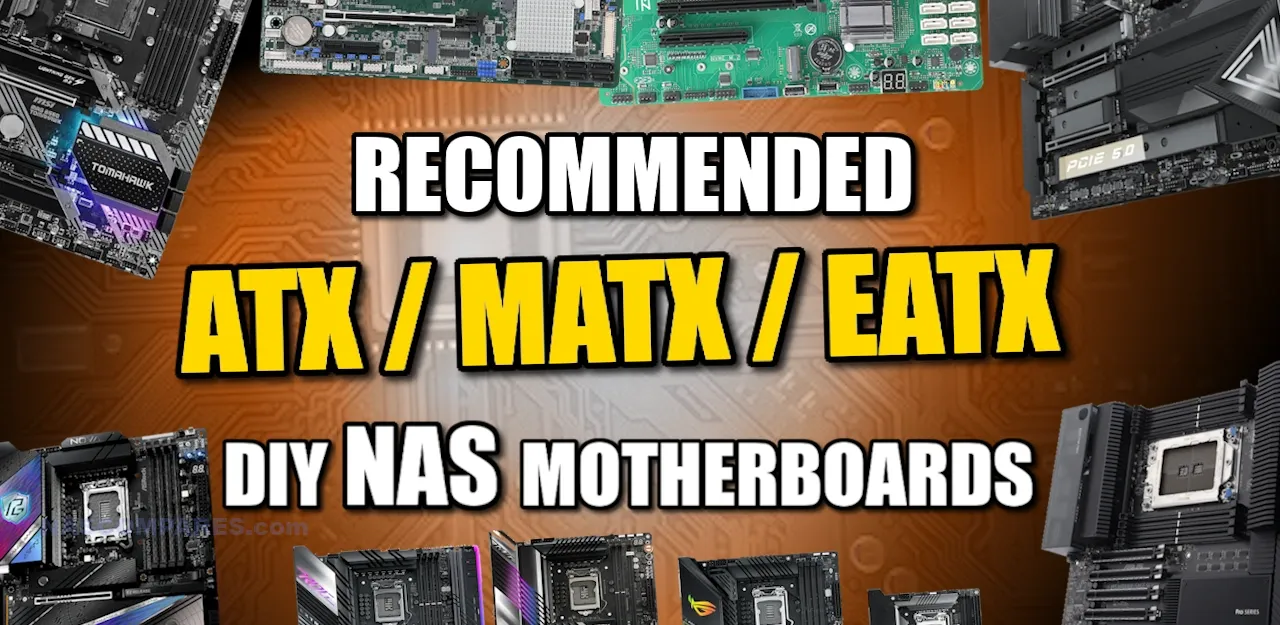



What is the Cheapest Mobo for a Nas?
A mobo that you already have.
REPLY ON YOUTUBE
For consumer/gamer boards (not server grade), the Asrock x570 Taichi looks great. With an AMD 5600g, you could add two lsi cards for a total of 24 sata3 ports, and there’s room to add a 10gbe NIC, whether in the third PCIE or an M.2 slot. And it supports ecc ram.
REPLY ON YOUTUBE
I need to upgrade from my i7-4790 based Nas.
REPLY ON YOUTUBE
Annoying that eatx is very expensive
REPLY ON YOUTUBE
I’m sorry, but these recommendations are INSANE! Who are you running a NAS for? A small office with 50 users? Then some of these would make sense. Otherwise, you are peddling boards that could easily be main gaming rigs.
The way I see it there are only two rational paths here. Either you live in a part of the world where electricity is very expensive and you pick a platform based on a mobile chip or, like me, you live where electricity is very cheap. In which case pretty much any 10 year old PC will probably do you just fine.
I myself am running truenas on an AMD Phenom X4 from around 2008 with 8GB of ram. I have a bunch of cheap as possible SSDs in there (more details below) and this works just fine running storage, jellyfin, home assistant, othàrr docker containers, and a couple more. I have other self hosted things running on raspberry pis that just link to the NAS via nfs if they need storage but most of those are just because I kinda have them. This idles at around 130W and draws around 3.2kWh per day. At my local prices that costs me just over $100 a year to run. AKA low enough that I don’t care. Hell, it would take me something like 5 years of energy savings assuming an idle draw of 30W or so to even afford one of your motherboards not to mention CPU and RAM.
Can this ancient beast run all my SSDs at full speed all at once? No, probably not. Can it stream in full 4k locally? You betcha. Can it stream over the internet in full 4k to a remote location? All day long. Do any of the other self hosted services I run on this thing ever get bottlenecked by its ancient platform? No.
My point is that most people need very little when it comes to server horsepower. Way less than you’d think in fact. While my rig is probably too old to consider buying today, you could easily pick up something 7-10 years old that would perform beautifully for around $100 used motherboard, CPU and RAM all in.
For me, that rig used to be my main PC back in 2008. Now it’s my NAS. Soon, it’ll be time to retire it as my NAS, but I’ll probably keep running it as a dedicated backup server, because why not? It still runs. If it can be a main NAS today, it can certainly be a backup server which barely does anything.
As for the more details on my cheap SSDs, I know that spinning rust is cheaper per TB by quite a bit. But here’s my theory. I’ve had quite a few HDDs fail on me, but never once an SSD. Since my use case is almost entirely write once and read many type of storage, SSDs are ideal and will hopefully last for practically ever. Yes, this is a personal theory and personal experiment, but I feel it’s the way to go for me for now, but I might throw 3 used enterprise spinners in there in another raidz1 just to bulk up my storage by quite a lot. We’ll see. I’m currently somewhere near 11TB in all sata SSD storage which is starting to get a bit tight.
TLDR, this is main rig levels of money not NAS money. A NAS can run on a cheap as dirt potato with no issues unless you are running it for a small office or something or have enough kids constantly watching jellyfin to qualify as a small office.
REPLY ON YOUTUBE
One thing I’d add is that WRX80 boards can be combined with shockingly cheap Threadripper Pro CPUs from Ebay. You can find the 3945WX and 3955WX for less than $300 easy. I’m using an Arock Rack WRX80D8-2T, the only negative is lack of BIOS updates but the thing just works. For Proxmox I’m having zero issues and IPMI functionality is excellent. Mounted it with 256Gb ECC, an Asus Hyper M.2 with 4x4Tb NVME, an extra 10Gb card to passthrough to Truenas as passing through the onboard results in some performance loss but I get full transfers passing through it’s own adapter and an LSI card to mount 8x14tb drives right now in a ZFSx2 pool for Truenas. The machine is ultra quiet and a proxmox beast. Data transfers are super fast and my test station. While I’m using software decoding, converting from 4k to 1080p isn’t even making a big dent in CPU use.
REPLY ON YOUTUBE
Been pretty happy with my Q670 for my first build!
REPLY ON YOUTUBE
I would suggest, if you’re looking at used, take a look at some of the Supermicro server boards. You can go older E-xxxx Xeon support, or for not even a lot more money you can find Xeon Scalable Gen 1 (SkyLake) or Gen 2 support. These boards rock a ton of PCIe, and often have up to 4 10GbE ports and almost all of them (except the workstation boards for some models) have ipmi dedicated 1GbE ports for remote management. And you can get a complete box, with 12 SAS3 hot-swappable bays, Redundant PSU’s and even the CPU and memory (often 128GB ECC) for around $1500. Hard to beat, and the noise isn’t terrible, just not deskside quiet. With 12 drives (four u.2 NVMe) these pull about 100W at idle.
REPLY ON YOUTUBE
just tell me, why do you neewd 2 eth port. I watn a mobo weith one etzhernet port. i dont care
REPLY ON YOUTUBE
wery good start ,
REPLY ON YOUTUBE
I am trying to part out an AM5 / ECC NAS. I really like the SilverStone CS382, but it’s mATX only, and looking for mATX boards sucks. The perfect board would be an AM5 board with true ECC support (e.g., it actually reports errors like it’s supposed to; some motherboards claim ECC support but this doesn’t happen on them), three PCIe slots (one for an Intel Arc A310 for QuickSync, one for a LSI SAS HBA, and one for a high speed NIC) but ideally also with a couple M.2 slots for the OS. Finding a motherboard that fits all this is hard. In a perfect world it’d have IPMI too, but even server boards don’t seem to tick all the boxes I want.
REPLY ON YOUTUBE
That MSI B550 motherboard is $99 on sale on amazon. Seriously debating if I should get it now. It would be a great upgrade for me, even for normal PC, not just NAS.
REPLY ON YOUTUBE
I picked up a new TUF GAMING X670E-PLUS WIFI board on Amazon for $129 during Black Friday. Four NVMe slots (1 Gen5, 2 Gen4 and 1 Gen3, all x4.). You can run the Gen3 slot at x2 and still use all 4 SATA ports. It also supports x4/x4/x4/x4 bifrucation on the main PCIe Gen5 slot, plus 2 Gen4 x4 slots. Absolute beast.
REPLY ON YOUTUBE
Great video. good info.
I wanted ri add that most non apu AM4 cpu’s support ecc memory, not all motherboards do. And even in motherboards say they support it, it does not mean it will post actual errors to the OS.
I tested 4 motherboard of 3 different brands and only an Asus motherboad really posted errors.
When using ecc with AM4 be sure to test your ecc memory to see of you really see t he actual errors with memtest. If not, you have no idea if it works, eventhough it is enabled.
Am4 and ecc is a hell.
REPLY ON YOUTUBE
This video should have come out before Black Friday ????
REPLY ON YOUTUBE
Gigabyte MC12-LE0 or the MC13 version? At least it is more server grade than rhe gaming boards…
REPLY ON YOUTUBE
your mic is broken ?
REPLY ON YOUTUBE
-compared to the antiquated 8 slot ds1821+ Q2 2021 cpu ,its well over twice as fast at single threading but you can under clock it if you really want to compare- AMD Ryzen 3 3200G £49, MSI PRO B550M-VC WiFi ProSeries Micro-Atx Motherboard with x8 sata ports, x4 pciE slots £107, PCIe 3.0 x1 to 5GbE adapter (WP-NA5000) Realtek RTL8126 $29.99, WisdPi USB 3.2 to 5GbE Adapter (WP-UT5) Realtek RTL8157 £45, Fractal Design Node 804 £99
REPLY ON YOUTUBE
Thanks for putting this video together. I’m a newbie to NAS and have been doing research for hours upon hours. All I want is a compact 8-bay NAS that would be used for video storage and very little 4K video playback (Jellyfin) and I think the IMB-X1314 would be great for my situation. Now to find a good case!
REPLY ON YOUTUBE
Is this guy allergic to mainstream Ryzen.
REPLY ON YOUTUBE
ASUS Pro WS W680 ACE
DDR5 ECC Support
2 PCIe 5.0 x16 (x16/x0 or x8/x8)
2 PCIe 3.0 x16 (x4 signal)
1 PCIe 3.0 x1
3 M.2 4.0 x4
8 SATA (4 SATA Ports + SlimSAS)
2 Intel 2.5Gb Ethernet
REPLY ON YOUTUBE
No asrock taichi lite?
REPLY ON YOUTUBE
Bonkers
REPLY ON YOUTUBE
1:20 mini und micro verwechselt?
REPLY ON YOUTUBE
How about am5 epyc processor which also have ecc support ?
REPLY ON YOUTUBE
I would like a ATX board with every PCIe lane assigned to PCIe slots so I can choose what I want to do with it, no M.2 etc. The state of affairs is lame. You can get used 100Gb nics for under $150 off ebay and used Cisco 100Gb switches for under $400 but want a PCIe board with a bunch of lanes.. nope. I miss the days of the X58, X99 and X299.
REPLY ON YOUTUBE
I’ve been a subscriber for long time and thinking of upgrading my NAS? I’ve got an old skool HP ProLiant N40L, is there any worth in upgrading the components? Can they even be upgraded? Seems a perfectly good 4-bay NAS to get rid of?
REPLY ON YOUTUBE
The Z980 Nova WiFi spec page specifically states it supports non-ECC memory, and ends there.
REPLY ON YOUTUBE
Thats my size! Thank you!
REPLY ON YOUTUBE
I’m a simple man. I see a new Nas Compares video, I neglect my responsibilities
REPLY ON YOUTUBE
Why don’t Chinese manufacturers do a flat pack version of nas case to help lower the cost of shipping it think you would sell more because people are put of by the high cost of shipping.
REPLY ON YOUTUBE